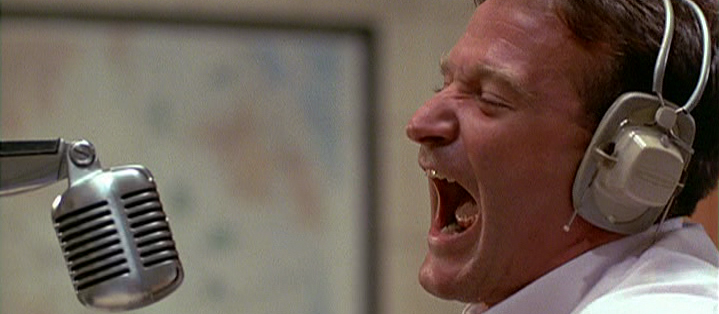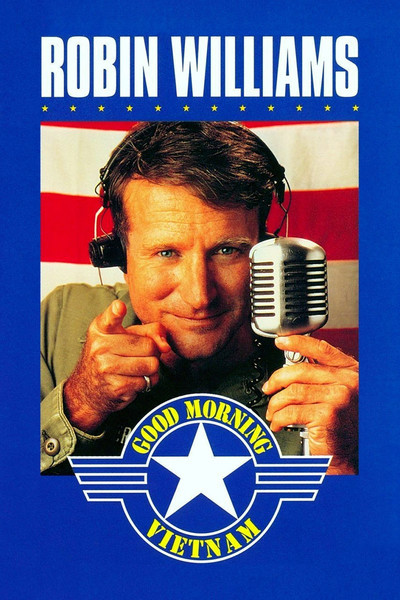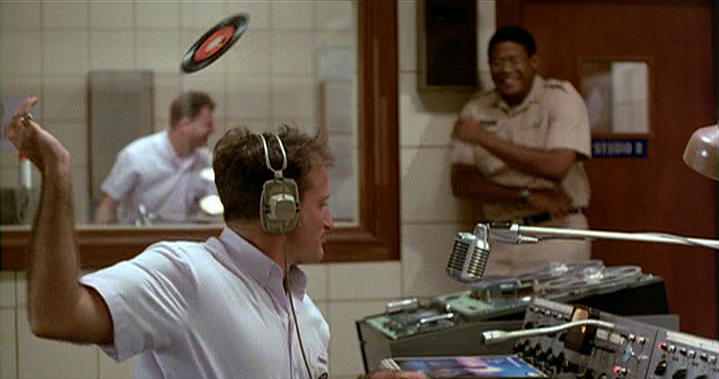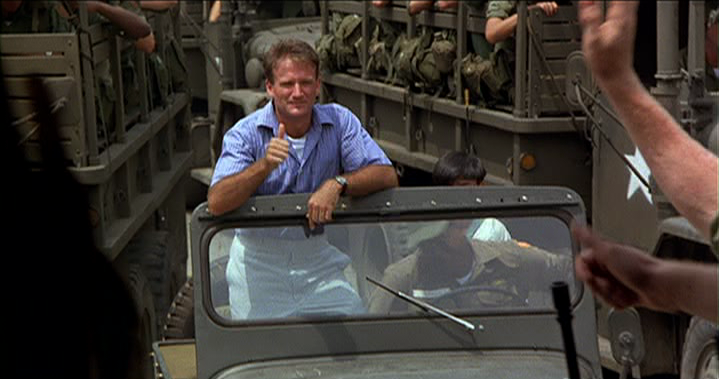

“It’s gonna be hot and wet! That’s nice if you’re with a lady, but it ain’t no good if you’re in the jungle.”
Robin Williams was a stand-up comic who always seemed to come on heavy with his zany humor, often overpowering his underrated dramatic skills. In cases where his characters were thoroughly hemmed in by the material (Good Will Hunting (1997), Insomnia (2002)), his focus was excellent and he excelled beautifully. Where he was allowed to run wild (Mrs. Doubtfire (1993), Flubber (1997)), his stunts could cloud out every other element of the film. In Good Morning, Vietnam, Barry Levinson gives Williams the chance to play to his strengths. Adrian Cronauer (Williams) is a disc jockey for the Armed Forces Radio Service during the Vietnam War, where his juvenile on-air antics serve to distract the troops from their day-to-day lives. He becomes incredibly popular with the troops but his irreverence garners consternation from his superiors. The film does turn a bit somber and serious toward the end, but for most of its two hours, Williams is allowed to spout off to delightful results.
The plot is well-developed but never intricate. When Cronauer (who is really just Williams playing himself1) first arrives in Saigon, he is escorted to the radio station by Private Edward Garlick (a young Forest Whitaker) where he is introduced to his superiors, Lt. Steven Hauk (Bruno Kirby) and Sergeant Major Phillip Dickerson (J.T. Walsh). A dazed Cronauer, uncertain of his surroundings when he is awoken early the next morning, is brought into the radio booth, where he groggily meets his co-hosts. Then, as soon as he flips the switch and begins transmitting live to the troops, he comes to life: “GOOD MORNING, VIETNAM!” He launches into a scatterbrained, manic monologue—changing his voice and his mannerisms several times, singing, doing sound effects. It’s glorious.
Throughout, Williams’s improvisational genius is on display, oozing from every scene he is in as his brash demeanor rubs against his superiors’ expectations. But beneath the comic sheen the film also puts forth a strong anti-war message and has a sentimental streak as well. Though the narrative is not complex, it is earnest. One of the more striking moments is when a Vietnamese village is bombed while Louis Armstrong’s ‘It’s a Wonderful World’ plays over the montage of carnage. Williams is able to showcase his dramatic abilities as he cares for the wounded, and stands up to the officers who censor the news that he is allowed to read on air.

In Saigon today, according to official sources, nothing actually happened. One thing that didn’t officially happen was a bomb didn’t officially explode at 1430 hours, unofficially destroying Jimmy Wah’s cafe. Three men were unofficially wounded, and two men whose identities are not known at this time… the fire department responded, which we believe to be unofficial at this present moment.
There is a silly subplot where Cronauer tries to wiggle his way into a romantic relationship with a young Vietnamese lady named Trinh (Chintara Sukapatana), who ironically cannot understand his humor and speaks in broken English. Cronauer follows (stalks) her to her English class, where he bribes the American teacher to let him teach the class. He bonds with the students, teaching them street slang from Queens, and must befriend Trinh’s brother Tuan (Tung Thanh Tran) before he has a chance to meet Trinh—which finally happens at a traditional large family gathering. The narrative ends up a bit scattered, but the main cast exhibit an incredible sense of camaraderie which allows some of the shortcomings to be overlooked. The other radio personnel, Marty Lee Dreiwitz (Robert Wuhl), Abersold (Richard Edson), and Dan “The Man” Levitan (Richard Portnow) all seem to enjoy sharing the screen with the star, and their zippy dialogue seems delightfully natural.
In one of the most hilarious scenes, the team is supposed to broadcast highlights from former Vice President Richard Nixon’s speech. Cronauer has just finished a four-hour stint on the air and is ready for lunch, but is told he must sit down and edit the speech. When the broadcast finally airs, Hauk and Dickerson panic when they hear Cronauer’s voice on the broadcast. “Why would Cronauer’s voice be on this tape?” He has cut and pasted Nixon’s tape to answer his own interview questions.
Cronauer: Mr. Nixon, thank you for that concise political commentary, but I think I’d rather delve into something slightly more personal for the men in the field. How would you describe your testicles?
Nixon: That they’re soft, that they’re very shallow, that they have no purpose.
C: What are you saying, sir?
N: That they lack the physical strength.
C: How would you describe your sex life with your wife Pat?
N: “t is unexciting sometimes.
C: Well, have you considered possibly a sex change? There is an operation that can transform you into a female great dane or possibly a very hell wung chihuahua. Mr. Nixon, while you’ve been in Vietnam, it’s rumored that you’ve smoked marijuana. Are you planning, sir, to take some of the marijuana home back to the United States? How would you do that?
N: By plane. By helicopter. And also by automobile.

Released in an era when Vietnam War films were coming out left and right, Good Morning, Vietnam stands out as one of the best. Platoon interrogates the experience of an individual soldier and raises moral questions. Full Metal Jacket shows the tensions that arise between soldiers on the same side of the conflict. Good Morning, Vietnam obviously is not as serious as those films, but it is a serious war film, dealing with the morale of the troops and the reality of senseless death. It occasionally pushes our mostly harmless main character into perilous situations, where the conflict becomes real. So while it is primarily a comedy, it also realistically portrays war in a way that something like Rambo: First Blood Part II does not, as the Stallone film simply uses the war as a backdrop for an action film.
Eventually, Cronauer is sent home because it turns out that his friend Tuan is a terrorist—something that Cronauer cannot believe until Tuan screams at him in broken English, “What is enemy? You killing my own people so many miles from your home. We not the enemy! You the enemy! […] My mother is dead. And my older brother, who be 29 years old, he dead! Shot by Americans! My neighbor, dead! His wife, dead. Why? Because we’re not human to them. We’re only little Vietnamese.” Even when you begin to see the simplicity of the plot and how mechanical it is, the outstanding performance by Williams is enough to hold things together. Not to mention the 1960s soundtrack that the radiomen select for the airwaves is sublime. I think the film leans a bit too heavily toward sentiment and anti-war commentary, but those are minor complaints. This is Robin Williams at his best.2
1. Adrian Cronauer was a real AFRS radio deejay, who had tried to get his story made into a sitcom. Levinson did not allow the two to meet each other out of fear that Williams would unconsciously begin impersonating the real Cronauer on set. According to Cronauer, his humor is a different brand than that of Williams, and wouldn’t have landed as well. “If I were half as funny as Robin Williams, I’d be out in Hollywood going na-noo, na-noo and making a million dollars. Once people get to know me, they realize very quickly that I’m not Robin Williams.”
2. This is not the best film that Robin Williams is in; but it is his purest performance—the one that best encapsulates both his dramatic range and his comic genius.
Sources:
Barthold, Jim. “The Real Life of Adrian Cronauer”. Urgent Communications. 1 March 2005.
Hi there, I just noticed your RSS feed isn’t functioning correctly, thought I should let you know.
Why isn’t a dime worth as much today as it used to be? Because the dimes have changed.
Is it alright to put part of this on my website if I post a reference to this web page?
I like your review yet do not concur with all your points. Cannot argue with the general tone though. Well written as well!
Websites like yours are really rare in a webspace full of crap and spam.